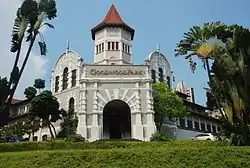Ezekiel Saleh Manasseh
Ezekiel Saleh Manasseh (died 19 May 1944) was a Singaporean rice and opium merchant and hotelier of Iraqi-Jewish descent, who co-founded Singapore's Goodwood Park Hotel with his brothers Morris and Ellis. During the Japanese occupation, Manasseh was sent to Changi Prison where he died in 1944. Eden Hall was built as his home in 1904, and is now the official residence of the British High Commissioner in Singapore.



Early life
Ezekiel Saleh Manasseh was born in Calcutta, the son of Saleh Manasseh, the founder and owner of S. Menasseh & Company (Gunny Rice and Opium Merchants), which was founded in Calcutta in 1883.[1]
In 1885, his father at S. Menasseh & Company was in partnership with Saul Jacob Nathan, and after his death, was replaced by his widow Mrs S Manasseh, and Maurice Saleh Manasseh, Ezekiel Saleh Manasseh, and Reuben Manasseh all joined the partnership.[2]
Career
Manasseh, a rice and opium merchant, had Eden Hall built for him in 1904 to a design by R. A. J. Bidwell, who also designed the Raffles Hotel and the Goodwood Park Hotel.[3] It is now the official residence of the British High Commissioner in Singapore.[3]
In 1918, after the end of World War One and the defeat of Germany, the British government sold what had been the Teutonia Club by public auction to the Manasseh brothers (Morris, Ezekiel and Ellis), who renamed it Goodwood Hall and converted it into the Goodwood Park Hotel. Manasseh continued to be a third owner until his death.[4][5][6]
In 1924–1925, Manasseh built numbers 1, 3 and 5 Club Street.[5] In the 1930s, he was the chairman of the Singapore Turf Club.[7] He was a trustee of the Maghain Aboth Synagogue.[1]
Personal life
Manasseh was married and had two stepchildren, Vivian and Molly Bath.[3] His stepson Vivian went to a labour camp on the Japanese island of Hokkaido.[3]
When Singapore was taken by the Japanese in 1942, Manasseh was sent to Changi Prison, and died there on 19 May 1944 in the prison hospital on Sime Road, aged recordedly 68.[8][3][7][9]
His nephew was the architect Leonard Manasseh, who was born in Eden Hall in 1916.[10]
References
- "Origins of the Baghdadi Trade Diaspora". Geni.com. Retrieved 3 December 2016.
- Jerome Ch'en; Nicholas Tarling (10 June 2010). Studies in the Social History of China and South-East Asia: Essays in Memory of Victor Purcell. Cambridge University Press. p. 260. ISBN 978-0-521-13374-6.
- Peterson, Jane A. (11 September 2014). "Eden Hall in Singapore Houses British Officials". The New York Times. Retrieved 3 December 2016.
- Wan Meng Hao (15 April 2011). Heritage Places of Singapore. Marshall Cavendish International Asia Pte Ltd. p. 119. ISBN 978-981-4312-95-0.
- Kalpana Rashiwalakalpana (3 July 2014). "$22m asking price for five shophouses at Club Street, Real Estate". The Business Times. Retrieved 3 December 2016.
- Gan Ee Bee; Chew Mei Lin Caroline. SINGAPORE INTERPRETATION: The Heritage Story. Tusitala (RLS) Pte Ltd. p. 32. ISBN 978-981-09-7849-5.
- "Portrait of Mr. Ezekiel Manasseh, before 1945 – BookSG – National Library Board, Singapore". Eresources.nlb.gov.sg. Retrieved 3 December 2016.
- CWGC casualty record, Malaya civilian deaths.
- "Archived copy". Archived from the original on 20 December 2016. Retrieved 3 December 2016.CS1 maint: archived copy as title (link)
- Brittain-Catlin, Timothy (20 May 2016). "Architect Leonard Manasseh at age 100 | Blog | Royal Academy of Arts". Royalacademy.org.uk. Retrieved 3 December 2016.